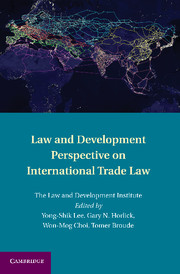Book contents
- Frontmatter
- Contents
- About the Editors and Authors
- Acknowledgments
- Law and development perspective on international trade law
- Introduction
- Part I Developing Countries and International Trade
- Part II Law and Development in the World Trade Organization
- Part III Law and Development in Free Trade Agreements
- 9 North–South Regional Trade Agreements
- 10 Free Trade Agreements
- 11 Developing Countries, Trade, and Human Rights
- 12 Free Trade Agreements and Foreign Direct Investment
- Part IV Law and Development in Regional Initiatives
- Epilogue
- Index
- References
11 - Developing Countries, Trade, and Human Rights
Free Trade Agreements, Development Needs, and the European Union's Generalized System of Preferences
from Part III - Law and Development in Free Trade Agreements
Published online by Cambridge University Press: 05 August 2011
- Frontmatter
- Contents
- About the Editors and Authors
- Acknowledgments
- Law and development perspective on international trade law
- Introduction
- Part I Developing Countries and International Trade
- Part II Law and Development in the World Trade Organization
- Part III Law and Development in Free Trade Agreements
- 9 North–South Regional Trade Agreements
- 10 Free Trade Agreements
- 11 Developing Countries, Trade, and Human Rights
- 12 Free Trade Agreements and Foreign Direct Investment
- Part IV Law and Development in Regional Initiatives
- Epilogue
- Index
- References
Summary
Introduction
Preferential trade arrangements, principally free trade agreements and trade preferences for developing countries offered pursuant to the Generalized System of Preferences (GSP), have been used by the United States and the European Union to link international trade and human rights formally. Recent developments include the adoption by the Council of the European Union (EU) on July 22, 2008, of Council Regulation (EC) No. 732/2008. This regulation continues, with slight modification, the arrangements established under Council Regulation (EC) No. 980/2005. The 2005 regulation was itself the EU's response to the World Trade Organization (WTO) Appellate Body's decision in European Communities – Conditions for the Granting of Tariff Preferences to Developing Countries. Other important developments have included the continuing evolution of the labor chapters of free trade agreements (FTAs) entered by the United States. The extent of this evolution is apparent when one compares recent FTAs, such as that negotiated with the Republic of Korea in 2007, with earlier FTAs and the North American Agreement on Labor Cooperation (NAALC), which is a side agreement to the North American Free Trade Agreement (NAFTA).
- Type
- Chapter
- Information
- Law and Development Perspective on International Trade Law , pp. 277 - 296Publisher: Cambridge University PressPrint publication year: 2011

